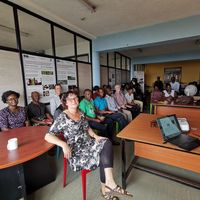In the African-German cooperation project "Machine Learning to Predict Crop Yields of Smallholder Farmers", a software system will combine indigenous knowledge with other data such as satellite images and 3D plant models to enable a better prediction of crop yields. The project was selected from over 100 projects as part of the "Advocating Women Scientists in STEM" program and will initially be sponsored with 56,000 euros over six months.
During this time, collaboration will be established with project partners Dr. Joyce Nakatumba-Nabende from Makerere University in Uganda and Dr. Muthoni Masinde from the Central University of Technology in South Africa. Project coordinator Prof. Dr. Regina Pohle-Fröhlich from the iPattern Institute is using the first phase of the project to develop and consolidate intercultural synergies.
Climate change is causing harvest problems for farmers in Africa. The early detection of harvest problems is intended to reduce farmers' financial losses and increase food security. African farmers, who are often women, currently rely on indigenous knowledge, which is no longer reliable due to climate change. By using innovative technology in the field of artificial intelligence, more efficient forecasts for crop production are to be developed in order to optimize crop yields. The target locations are Uganda, Kenya, South Africa and Mozambique.
The project also aims to sponsor women in particular. Female doctoral students have the opportunity to conduct research in the field of artificial intelligence for the duration of their doctorate. The international cooperation is expected to lead to a high level of knowledge gain. Research presentations and discussions are intended to create an intensive exchange with professors from the participating faculties and students in the respective Bachelor's and Master's degree programmes. The aim is to develop a joint course, for example in the form of a Master's project subject.
"Intercultural collaboration creates synergies that we expect to produce outstanding results," says project coordinator Prof. Dr. Regina Pohle-Fröhlich. "It is a fulfilling feeling to be able to work on a topic that helps people in the long term."
















